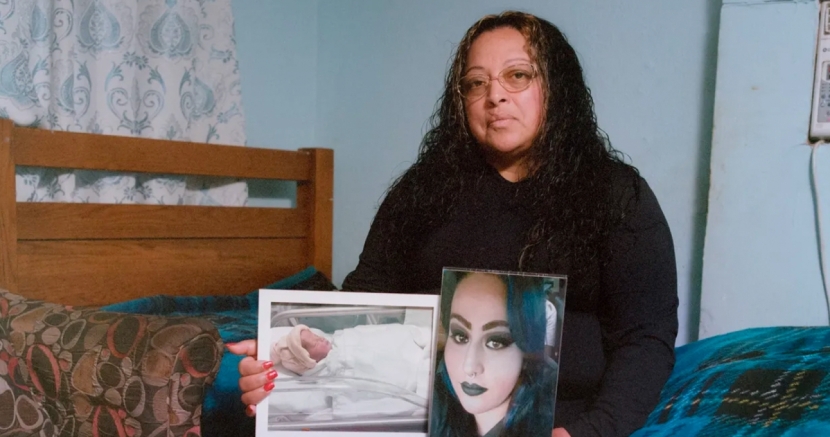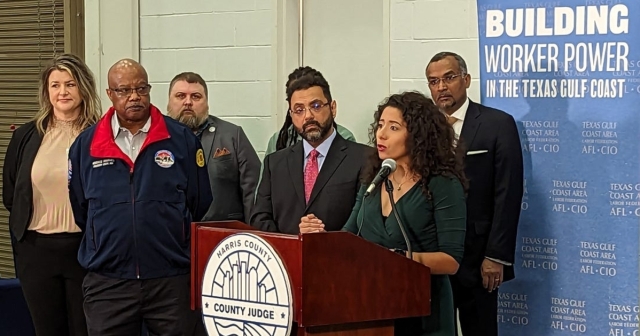Toplines & Key Facts:
- Yeniifer Alvarez-Estrada Glick died two weeks after Roe’s overturn
- Fear around administering reproductive healthcare contributed to her death
- Her many medical conditions made this a high risk pregnancy
- In more than five hospital visits, her doctors never discussed an abortion
Who was Yeni?
Yeniifer Alvarez-Estrada Glick was a nursing aide with dreams of being a scientist. She was a daughter, a sister, a wife, a mother, and above all someone who deserved better. Yeni lived in Luling, Texas, for the majority of her life. She was a matriarch in her family, caretaking for her younger siblings (her niños), helping with finances, all while trying to follow her own path.
On her way to achieving those dreams, she married her husband, Andrew Glick, in Nov. 2021 with plans of leaving Luling, taking her niños with them. However, these plans were disrupted only a month after, when she announced her pregnancy. They later discovered they were having a baby girl, who would be named Selene.
Pregnancy Timeline
Yeni’s pregnancy was high-risk. She had pre-existing medical conditions, including hypertension (high blood pressure), diabetes, and pulmonary edema (a recurring condition for her which filled her lungs with fluid.) Additionally, she was uninsured and had to work often to pay for her increasing healthcare costs, about which she said “I’m just done I don’t know what to do. They won’t help me unless I get insurance but I can’t get insurance.”
As her pregnancy progressed, her health deteriorated. First, she went to the only hospital in Luling for treatment, but they did not have the resources for high-risk pregnancies like hers. “The number of women giving birth in the Luling E.R. was surging. . .babies were being delivered in the waiting room, or crowning on a stretcher in the hallway, the four beds being occupied.”
But Yeni’s breathing and blood pressure worsened, so she was referred to an Ascension Seton hospital in Kyle. The physicians recommended hospital admission, but she could not afford to stay for hypertension treatment. On May. 9, she was admitted to the Ascension Seton Medical Center in Austin, this time on the brink of death at 26 weeks pregnant. After several days of recovery, she was discharged, though “her family wondered if she would have been kept in the hospital longer had she been insured.”
Notably, at no point during any of the more than five hospital visits and considering her many complications, was an abortion mentioned or recommended, despite its potential to increase her chances of survival.
On July 10, 2022, she was dead. After several hours of waiting for an ambulance, and once again having to travel further for maternal healthcare in Austin, she arrived at the hospital with no pulse. Days later, her family gathered for a funeral instead of what was supposed to be a baby shower on July 15.
It is reprehensible that an abortion was not mentioned at any point, by any of her doctors, considering it likely could have saved her life. This denial of crucial medical information can be attributed to a chilling effect from anti-abortion legislation.
Circumstances Surrounding their Deaths
Yeni and Selene died only two weeks after Roe was overturned on June 24, but its effects took a toll prior to that day. Texas Senate Bill 8 banned abortions past six-weeks, with exception for cases of “medical emergency.” This purposefully vague term has caused Texas doctors to feel disempowered in implementing treatments for fear of litigation: another part of SB 8 which encourages Texas citizens to investigate and turn in people who seek or help enable an abortion.
So, even before Roe was overturned, doctors were in a compromised position that threatened their personal safety over their patients. Discussing abortions with patients like Yeni became a danger, true for both parties involved, and deadly in Yeni’s case. Our state is a hostile environment for pregnant people: full of fear-mongering anti-abortion laws, surging pregnancies amid an increasing disparity to maternal healthcare, and doctors afraid of administering reproductive treatments. Her death certificate lists the cause of death as hypertension with the contributing factor of pregnancy, but living in Texas is ultimately what killed Yeniifer.
We can’t say if one thing or another would’ve prevented her death, but we do know that the circumstances leading up to it did not help her chances. Yeni was deprived of lifesaving information that could have become lifesaving medical procedures. What if she’d stayed at that Austin hospital, if insurance wasn’t the predicating factor in providing healthcare? What if she’d been offered an abortion at any point during her pregnancy, if these laws weren’t in place? What if she became pregnant, just not in Texas? What if she was never pregnant? She’d probably be alive today.
What if it was you?
Progress Texas is following this story as it develops, and you can find out more about Yeni’s story from the original article posted in The New Yorker by Stephania Taladrid.
- Check out our Resource Guide and get to know the Texas abortion climate!
- Join the Roevolution! Advocate for abortion rights and protect other Texans!
DONATE
Your donation supports our media and helps us keep it free of ads and paywalls.









